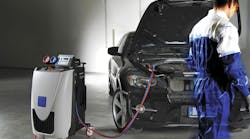Proposals hard on steering but would force changes for shops, too
Shops, insurers and consumers in Massachusetts might not have to wait much longer to see major reform to the state’s often maligned system of laws regulating the insurance and collision industries. In March, the legislature’s Joint Committee on Insurance released draft legislation designed to make sweeping changes to the way shops and insurance companies do business.
The march towards change began in 2003 when Mass. House Insurance Committee chairman Ronald Mariano (D) decided that a wide-ranging reform bill was necessary to settle long-standing contentions between insurance companies and shops, according to Rep. William Galvin (D). Galvin, who serves as vice-chairman of the Insurance Committee, was named chairman of the Auto Body Working group, a special committee given the task of writing the new legislation.
Made up of legislators, an alliance of insurers branding itself the Auto Repair Coalition, the Massachusetts Auto Body Association (MABA) and others, the Auto Body Working group held public hearings in January and spent months reviewing proposals for changes to existing insurance laws. Galvin penned the draft legislation, which is heavy on anti-steering measures and aimed at streamlining the repair process by eliminating mandatory appraisals and creating a system for expediting supplemental repairs.
Most of these provisions, notably, were advocated by the MABA. Spokesperson Steve Regan says, “We’re quite pleased they accepted the majority of what we submitted. They listened to both sides, and this is what they came out with. They obviously saw there was a need for change.”
Regan says that many of the separate provisions actually work together to form a larger anti-steering initiative designed to help put all shops on equal footing. Regan explains that insurers could no longer recommend shops or suggest by way of guarantees that one shop provides work superior to that of another. To address insurers’ desire to obtain high-quality repairs for their customer, the quality and professional level of all shops would be raised with tougher registration standards and higher bond rates to match the increased costs and values of modern automobiles. “This levels the playing field,” Regan says. “Consumers would go to shops based on the quality of the shop. Their choices would improve the industry.”
Insurers are not so enthusiastic about the draft and point to the anti-steering provisions as a large part of their reservations. “They’re way too broad,” says Peter Robertson, Massachusetts Counsel for the Property Casualty Insurers Association of America (PCI). “The customer has a relationship with the agent, not the shop. A customer only has contact with a shop every seven years or so. When a customer has an accident, they’re going to ask the agent for suggestions on where to go. It’s part of the natural dialog. Customers expect to be able to ask for help.”
Robertson also sees a problem with the language requiring insurers to pay a “fair and equitable rate,” saying that provision sets the stage for “more acrimony and litigation.” Regan defends the provision, stating that the rate could be determined by using the highest rate paid by any single insurer.
Members of the working group had until April 29 to respond to the draft with changes. Committee members then will craft a final bill and attach the number of an existing piece of insurance legislation to it. Depending upon the schedule of the Massachusetts House, the bill could be introduced for a vote by the end of the current legislative session scheduled for July 31.
The timing has Regan worried because the legislature is busy working on a budget and other legislation. Still, he feels the bill has a good chance to be made law. “Most members of the legislature vote the way the committee chairman does,” he says. “The important thing to remember here is that this bill will not be the product of shops or insurers. It’s a product of the legislature.”
Even with reservations over the current draft, Robertson believes the legislation is necessary. He says, “Our members have taken some big steps, and some have grave trepidations over this legislation. But they’re looking at a current system, overly bureaucratic, with high cycle times. It costs them an extra $2 million a year just for appraisals, over other states. We have to do something. The opportunity to make major reforms like this only comes along every 15 years or so.”

